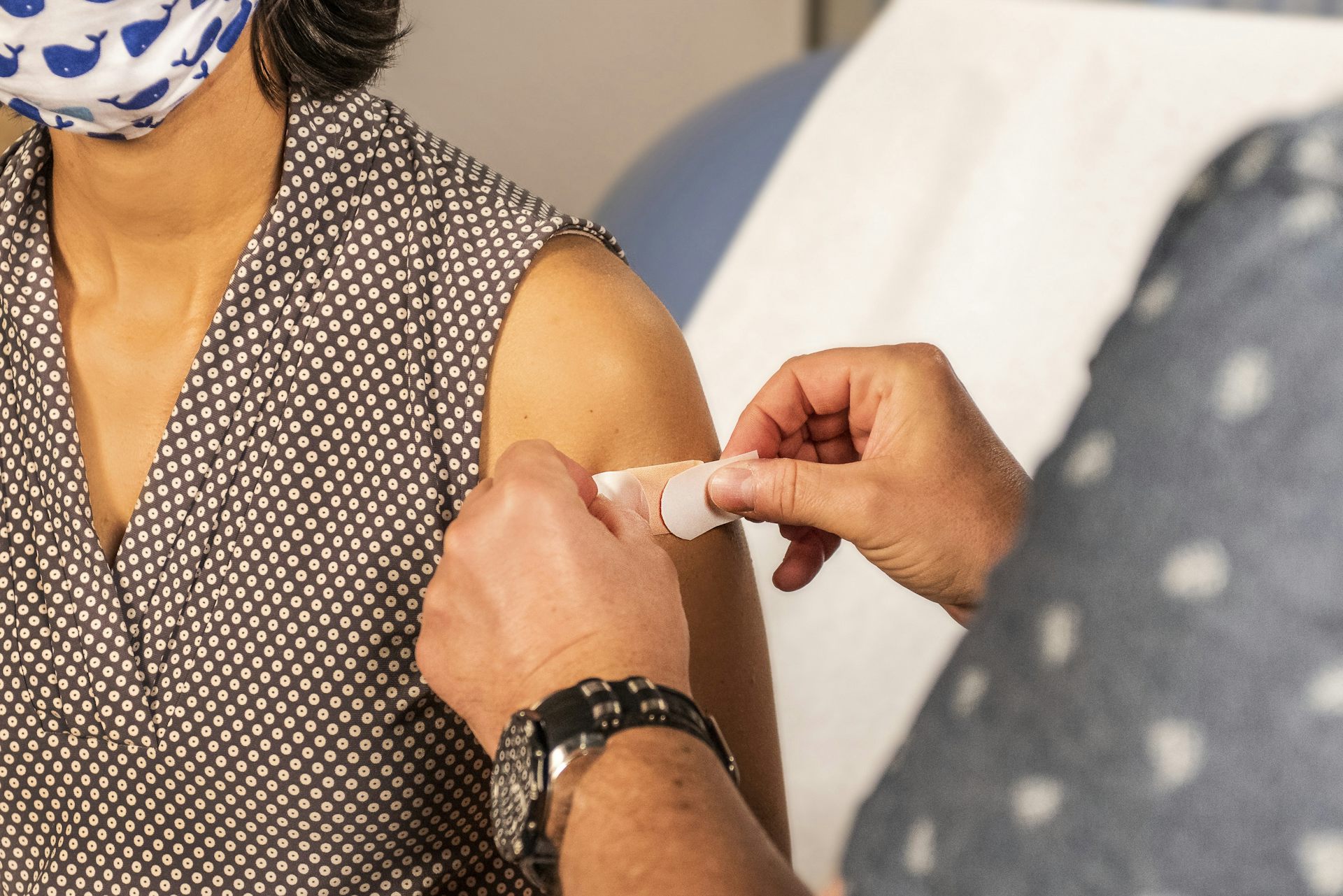What happens in our body when we encounter and fight off a virus like the flu, SARS-CoV-2 or RSV?
Having tested positive for COVID-19, I thought I would spend a little time finding out more about what's going on inside my body right now.
But the research has collided with the work I normally do in exposing the absurdity of creationism in all its guises and the futility of trying to force-fit real world evidence into origin myths made up by people from the fearful infancy of our species who thought Earth was just a small flat disc with a dome over it to keep the water above the sky out, centered on the Canaanite Hills where they hearded their goats, told their camp-fire tales of magic sky-gods and imagined it was all made just for them.
What occurred to me is the problem creationists would have if they knew enough about the subject and weren't too afraid to question their cult dogmas. For example: The standard creationist excuse for all the nasty little parasites such as viruses, bacteria, etc., is that they are the result of 'sin' which entered the world because of 'The Fall' (so betraying the fact that creationism isn't the science their cult leaders pretend, but religious superstition after all).
It always amuses me how cult leaders like Michael J. Behe make a big issue of the 'irreducible complexity' of bacteria such as E coli as evidence that creationism putative designer must have designed them, only to have them dismissed on another day in a different argument, as the creation of another 'evil' entity - 'sin'.
But with creationism, the tactic is to use whichever argument will work on the current audience, regardless of if consistence of intellectual integrity.
Incidentally, blaming 'sin' flatly contradicts the claim in the Bible that God told Isaiah that He created evil because he created everything.
I form the light, and create darkness: I make peace, and create evil: I the Lord do all these things.
So, either God lied to Isaiah or Isaiah lied in the Bible - or creationist cult leaders are lying to their cult.Isaiah 45:7 (KJV)
But let's forget that bit of Bible awkwardness and think things through a little more:
Humans were allegedly created before 'The Fall' so would have had no need for an immune system, which is our defense, imperfect though it is, against the parasites 'sin' created after 'The Fall'.
So, were we given an immune system after 'The Fall'? There is no mention of a major redesign in the Bible, but wouldn't it have been simpler for the creator to have forgiven Adam and Eve and stopped 'sin' creating these things in the first place? And of course, most multicellular species also have an immune system which wasn't needed before 'The Fall'.
Or, if he was really going to need to have himself sacrificed later in a blood offering first why did he wait several thousand years? Why couldn't he impregnate Eve, have Adam do the dirty deed and solve the problem there and then?
Or did he omnisciently anticipate what would happen and design immune systems for the (future) parasites right from the start? If so, he must have anticipated 'The Fall' and the creative powers of 'sin', including details of what it would create, and being omnipotent, could have stopped it.
Anyway, those are just a few of the many problems that creationism causes for itself by trying to fit reality into such an absurd myth, like trying to ram a large square peg into a small round hole, without changing its shape in any way.
Here then is the account of how our immune system tries, often unsuccessfully because it isn't very efficient, to cope when an infection enters our body. It is an article from The Conversation by Lara Herrero, Research Leader in Virology and Infectious Disease, and Wesley Freppel, Research Fellow, Institute for Glycomics, both of Griffith University, Australia. It is reprinted here under a Creative Commons licence, reformatted for stylistic consistency:

What happens in our body when we encounter and fight off a virus like the flu, SARS-CoV-2 or RSV?
Lara Herrero, Griffith University and Wesley Freppel, Griffith University
Respiratory viruses like influenza virus (flu), SARS-CoV-2 (which causes COVID) and respiratory syncytial virus (RSV) can make us sick by infecting our respiratory system, including the nose, upper airways and lungs.
They spread from person to person through respiratory droplets when someone coughs, sneezes, or talks and can cause death in serious cases.
But what happens in our body when we first encounter these viruses? Our immune system uses a number of strategies to fight off viral infections. Let’s look at how it does this.
First line of defence
When we encounter respiratory viruses, the first line of defence is the physical and chemical barriers in our nose, upper airways, and lungs. Barriers like the mucus lining and hair-like structures on the surface of cells, work together to trap and remove viruses before they can reach deeper into our respiratory system.
Our defence also includes our behaviours such as coughing or sneezing. When we blow our nose, the mucus, viruses, and any other pathogens that are caught within it are expelled.
But sometimes, viruses manage to evade these initial barriers and sneak into our respiratory system. This activates the cells of our innate immune system.

Sneezing and blowing our nose can help expel the virus.
Patrolling for potential invaders
While our acquired immune system develops over time, our innate immune system is present at birth. It generates “non-specific” immunity by identifying what’s foreign. The cells of innate immunity act like a patrol system, searching for any invaders. These innate cells patrol almost every part of our body, from our skin to our nose, lungs and even internal organs.
Our respiratory system has different type of innate cells such – as macrophages, neutrophils and natural killer cells – which patrol in our body looking for intruders. If they recognise anything foreign, in this case a virus, they will initiate an attack response.
Each cell type plays a slightly different role. Macrophages, for example, will not only engulf and digest viruses (phagocytosis) but also release a cocktail of different molecules (cytokines) that will warn and recruit other cells to fight against the danger.
In the meantime, natural killer cells, aptly named, attack infected cells, and stop viruses from multiplying and invading our body further.
Natural killer cells also promote inflammation, a crucial part of the immune response. It helps to recruit more immune cells to the site of infection, enhances blood flow, and increases the permeability of blood vessels, allowing immune cells to reach the infected tissues. At this stage, our immune system is fighting a war against viruses and the result can cause inflammation, fevers, coughs and congestion.
Launching a specific attack
As the innate immune response begins, another branch of the immune system called the adaptive immune system is activated.
The adaptive immune system is more specific than the innate immune system, and it decides on the correct tools and strategy to fight off the viral invaders. This system plays a vital role in eliminating the virus and providing long-term protection against future infections.
Specialised cells called T cells and B cells are key players in acquired immunity.
T cells (specifically, helper T cells and cytotoxic T cells) recognise viral proteins on the surface of infected cells:
- helper T cells release molecules that further activate immune cells
- cytotoxic T cells directly kill infected cells with a very great precision, avoiding any healthy cells around.
B cells are a critical part of memory in our immune system. They will remember what happened and won’t forget for years. When the same virus attacks again, B cells will be ready to fight it off and will neutralise it faster and better.
Thanks to the adaptive immune system, vaccines for respiratory viruses such as the COVID mRNA vaccine keep us protected from being sick or severely ill. However, if the same virus became mutated, our immune system will act as if it was a new virus and will have to fight in a war again.

Vaccines help us generate an immune response to viruses we’re immunised against.
As the immune response progresses, the combined efforts of the innate and adaptive immune systems helps control the virus. Infected cells are cleared, and the virus is neutralised and eliminated from the body.
As the infection subsides, symptoms gradually improve, and we begin to feel better and to recover.
But recovery varies depending on the specific virus and us as individuals. Some respiratory viruses, like rhinoviruses which cause the common cold, may cause relatively mild symptoms and a quick recovery. Others, like the flu, SARS-CoV-2 or severe cases of RSV, may lead to more severe symptoms and a longer recovery time.
Some viruses are very strong and too fast sometimes so that our immune system does not have the time to develop a proper immune response to fight them off.
This article is republished from The Conversation under a Creative Commons license. Read the original article.
Or a major redesign of most living organisms to protect them from what 'sin' was creating?
And are 'irreducibly complex' bacteria like E. coli, designed by your putative intelligent [sic] designer, or by another creative entity, called 'sin'?




No comments :
Post a Comment
Obscene, threatening or obnoxious messages, preaching, abuse and spam will be removed, as will anything by known Internet trolls and stalkers, by known sock-puppet accounts and anything not connected with the post,
A claim made without evidence can be dismissed without evidence. Remember: your opinion is not an established fact unless corroborated.